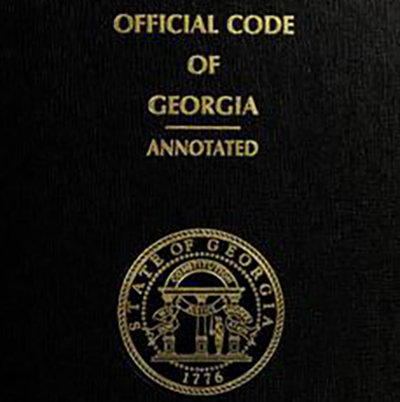Open Access: SCOTUS will consider whether publishers can copyright annotated state codes

A bound volume of the Official Code of Georgia Annotated. Photo from the Georgia Code Revision Commission.
Carl Malamud is a self-described techie and “open-source activist. This means that he works to improve public access to government records and primary legal materials.
In pursuit of that mission, he has tussled with the U.S. Securities and Exchange Commission, the major commercial legal publishers, private groups that develop model building codes and other technical standards, and any number of states.
Malamud’s latest battle, with Georgia, is set to go before the U.S. Supreme Court on Dec. 2. The 60-year-old Californian would be the first to say the case is a bit wonky. It stems from a 2013 move by the nonprofit organization that he founded, Public.Resource.Org, to purchase a set of the Official Code of Georgia Annotated, scan it and put it on the web.
That didn’t sit well with Georgia, which sued Public.Resource.Org alleging copyright infringement. For decades, the state has contracted with a legal publisher to prepare annotations to the code, such as summaries of judicial decisions that interpret the statutes. The publisher, LexisNexis, sells the annotated volumes to law firms, libraries and others. Georgia retains the copyright.
Malamud argues that the OCGA should not be protected by copyright because it is the only official version of the state’s code.
“If there is a commercial vendor for part of the law and a citizen has to go to that private vendor to seek a license for access to that part of the law to inform their fellow citizens about their rights, that is a serious problem in a democracy,” Malamud says.
 Carl Malamud is the founder of Public.Resource.org. ABA file photo by Tony Avelar.
Carl Malamud is the founder of Public.Resource.org. ABA file photo by Tony Avelar.
Annotations ‘are not the law’
The question in Georgia v. Public.Resource.Org Inc. is whether a work such as the Official Code of Georgia Annotated may not be copyrighted because it falls under the doctrine of “government edicts.” The doctrine stems from a series of 19th-century Supreme Court cases holding that judicial writings and other official legal works published under state authority are not “the proper subject of private copyright,” as an 1888 decision put it.
Georgia agrees that the law may not be copyrighted, but it argues that the annotations included in the OCGA are covered by the text of the Copyright Act of 1790 as “derivative works.”
“The annotations are just research references and finding aids,” says Joshua S. Johnson, an appellate counsel with Vinson & Elkins, representing Georgia. “They are summaries of judicial decisions and relevant law review articles published for the benefit of researchers. They are not the law themselves.”
Johnson points out that under the terms of its contract with the state, LexisNexis publishes a free version of the state’s statutes, stripped of the annotations, on the web. Also, the OCGA sells at a below-market price and is available at hundreds of libraries.
“Numerous states have similar arrangements,” Johnson says. “Congress was aware that states were relying on copyright incentives to induce commercial publishers to publish their codes.”
LexisNexis, part of the RELX Group, an information company, says it sells the OCGA for $404, while competitor WestLaw, part of Thomson Reuters, sells its own annotated version of Georgia’s codes for $2,570.
“LexisNexis puts a great deal of effort into creating this publicly valuable, affordable work,” the publisher says in an amicus brief it filed in support of Georgia.
Eric Citron, a partner with Supreme Court boutique firm Goldstein & Russell who represents Open.Source.Org, says Georgia is seeking to make the OCGA “legally special” for the commercial benefit of its publisher.
“I don’t think there is any dispute that Georgia is attempting to subsidize Lexis’ work by allowing [the publisher] to trade on the officiality of what the state is doing,” Citron says.
‘For the Public’
Malamud comes across as mild mannered but steely. Trained in economics and public policy, he created an internet radio station in 1993 that aired U.S. House of Representatives and Senate floor debates. He next developed a system to post financial filings from the SEC’s Electronic Data Gathering, Analysis and Retrieval database, fighting with the agency before it decided to adopt his system.
He has clashed before with LexisNexis and Westlaw. And he has battled with private organizations that develop and sell codes and technical standards on such subjects as fire safety, electrical work, heating and air conditioning and plumbing. Malamud thinks once those model codes are adopted as binding by government agencies, they should be freely available. The organizations disagree, and they have filed amicus briefs in support of Georgia.
In 2007, Malamud started Public.Resource.Org, which is based in Sebastopol, California. Malamud is the only full-time employee, and the organization receives charitable support to undertake its work.
“It has always been a legal tenet that the law must be available to all of the people,” Malamud says. “It is our contention that the entire Official Code of Georgia Annotated is something that is for the public.”
Public.Resource.Org has many friends at its side. Leslie A. Street, director of the law library at the William & Mary Law School and a clinical professor of legal research there, says there are multiple problems with the assertion that the general public can simply turn to a library to find the OCGA.
“Some people lack the physical ability to come in because of distance or cost,” says Street, who helped write a brief in support of Public.Resource.Org by law librarians and law library groups. She is also the co-author of a recently published paper, Who Owns the Law? How to Restore Public Ownership of Legal Publication, in the Journal of Intellectual Property Law.
“Meaningful access to the law is a fundamental prerequisite for due process, and ultimately the rule of law, yet the problem of private control is long-standing and growing worse in the advent of electronic publishing and publisher consolidation,” the paper says.
The budding movement for free resource materials online may be as significant as the emergence of West Publishing Co.’s National Reporter System in the late 1800s and the advent in the 1970s of subscription electronic legal sources such as LexisNexis and Westlaw.
A group of “next generation” legal research platforms and databases, including Casetext, Fastcase, Free Law Project and Justia, argue in an amicus brief supporting Public.Resource.Org that government edicts doctrine must cover the “legal core” of information—not just statutes and judicial opinions but also “legal information that has been created, adopted or imbued with the authority, imprimatur or sanction of the state,” such as the OCGA.
 Image from Shutterstock.com.
Image from Shutterstock.com.
One amicus in support of Public.Resource.Org looks to the past. The R Street Institute, a public policy organization in Washington, D.C., and others argue in their brief that official annotations have been part of the law going back to China in the time of Confucius, the Roman Republic and Empire from 450 B.C. through the Justinian codes several hundred years later, and England in the 15th century and later.
“From the beginning, nonbinding commentaries and annotations have carried legal weight,” the brief says.
A Familiar Realm for Justices
Johnson, the lawyer for Georgia, calls that brief interesting and well researched, but he argues that the type of annotations it discusses are quite different from the ones included on the OCGA.
“Those were authoritative glosses on the law and often became the law itself,” he says of the historical annotations.
Johnson argues that a decision against Georgia would scuttle a well-established system in which several states rely on copyright to give commercial publishers the incentive to create and maintain annotated codes. He suggests in a brief that one needs to only look to the experience of Pennsylvania, which has been trying for 50 years to codify its statutes using state personnel and offers no official annotated version.
Johnson and Citron are recent Supreme Court law clerks making their first arguments before the justices. And they both clerked in the 2012-2013 term, Johnson for Justice Ruth Bader Ginsburg and Citron for then-retired Justice Sandra Day O’Connor and Justice Elena Kagan.
Citron says the case revolves around a subject—legal research—that the justices and their clerks deal with on a daily basis.
“The last binding Supreme Court case on this topic was in the 1800s,” he says. “I think this case will be fun for them.”
See also:
ABAJournal.com: “Appeals court rules that Georgia annotated code cannot be copyrighted”
ABAJournal.com: “SCOTUS agrees to decide whether annotated state laws can be copyrighted”
ABAJournal.com: “Federal judge rules Public.Resource.org cannot print annotations to official Georgia state code”
ABAJournal.com: “Georgia sues Carl Malamud group, calls publishing state’s annotated code of laws online unlawful”



